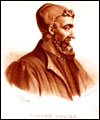|
Galen
Galen was born in Pergamos in Asia Minor in
the year 131 C.E. After receiving medical training in Smyrna and
Alexandria, he gained fame as a surgeon to the gladiators of Pergamos.
He was eventually summoned to Rome to be the physician of the
Emperor Marcus Aurelius. Galen spent the rest of his life at the
Court writing an enormous corpus of medical works until his death
in 201 C.E.
Taking Hippocrates’ notions of the humors
and pathology, Galen incorporated the anatomical knowledge of
noted Alexandrians such as Herophilus of Chalcedon (335-280 B.C.E.).
A supporter of observation and reasoning, he was one of the first
experimental physiologists, researching the function of the kidneys
and the spinal cord in controlled experiments.
Galen’s works in many ways came to symbolize
Greek medicine to the medical scholars of Europe and the Middle
East for the next fifteen centuries. His message of observation
and experimentation were largely lost, however, and his theories
became dogma throughout the West. In the mid-16th century, however, his message that observation and investigation were required for through medical research began to emerge, and modern methods of such research finally arose.
Galen.
De pulsibus. (Venice, ca. 1550).
This Greek manuscript of Galen’s treatise
on the pulse is interleaved with a Latin translation.
QUOTE
" … is he dead, my Francisco?
ha, bully! What says my Aesculapius?
my Galen? my heart of elder? ha! is he dead,
bully stale? is he dead?"
—William Shakespeare, The
Merry Wives of Windsor
|



